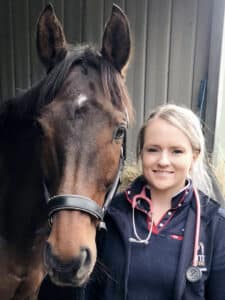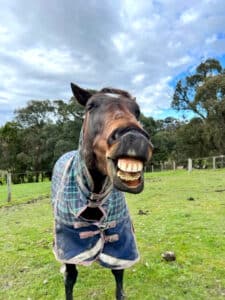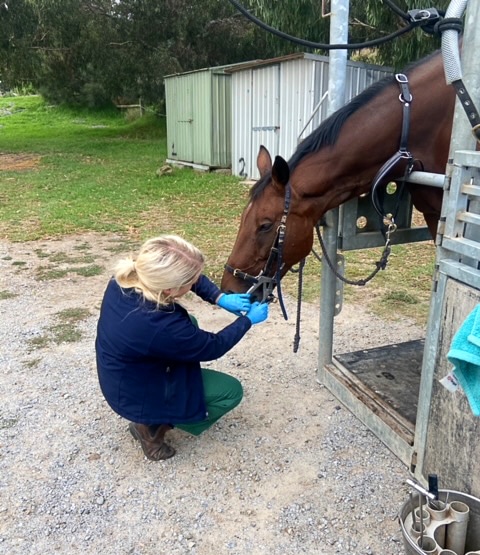Rebecca Powers grew up in Melbourne and worked on a Thoroughbred stud prior to starting her veterinary medicine degree at the University of Adelaide. She now specialises in equine veterinary work.
Q: Have you always had an interest in horses?
A: Yes, ever since I was a little girl.
Q: Have you ever been a competitive rider?
A: No, I ride for pleasure only.
Q: What ignited your interest in Veterinary Science?
A: A combined love of animals and science.
Q: You took various courses prior to going to the University of Adelaide’s veterinary school.
A: As part of my Victorian Certificate of Education, I completed a Certificate II in Equine Industry for which I received a Victorian Premier’s Award. In my gap year, prior to attending university, I completed a TAFE Cert III in Horse Breeding and worked at a number of riding schools and at a Thoroughbred stud. After graduating, I undertook a year-long internship at Agnes Banks Equine Clinic in Sydney.
Q: Have you ever worked as a small animal vet?
A: No, I went straight into equine veterinary work as I love horses and working outside.

Dr Rebecca Powers combined her love of animals and science to become a veterinarian.
Q: Where are you based?
A: In Macclesfield, Victoria.
Q: What’s the most challenging part of treating sick or injured animals?
A: Definitely seeing an animal in pain, and assisting owners who are upset and distressed.
Q: Elite Equine, the practice you have been working for since April 2019, has a strong focus on equine dentistry. Is this something which has been around for long?
A: Dentistry for horses has been documented over many centuries but only in the past few decades has it been recognised as being equally as important as all other areas of horse health.
Q: What significant advancements have been made in recent years?
A: We have better sedation protocols, which allow for a full and thorough examination of the mouth with a light source, dental pick and mirror. It’s also much safer for both the horses and their handlers. And we have better equipment, like video oroscopes and digital x-rays so we can see much more than we ever could before. This helps us to make a full examination and come up with a plan on farm to improve the dental health of the horses we assist.
Q: Do horses in different countries have different mouth problems?
A: Horses all over the world forage on different types of pasture, and management protocols vary greatly from country to country. This can certainly affect the type of wear on a horse’s teeth.
Q: When it comes to the maintenance of equine teeth how did the word ‘float’ evolve?
A: I believe it’s a stone mason’s term for smoothing out mortar, and in equine dentistry it refers to rasping, when tungsten carbide grit rasps are used to smooth off sharp enamel points on horses’ teeth. But the use of motorised equipment allows for more precision as you can visualise your treatment as you go.
Q: What are some of the most disturbing examples you’ve seen of neglected equine mouths?
A: As horses’ teeth continually erupt there is, unfortunately, a constant risk of pathology forming. Horses with fractured teeth are disturbing examples but that’s not always due to neglect. I also find the large hooks that dig into opposing gums when the horse closes its mouth very disturbing.
Q: Are there some bits which are bad for a horse’s mouth?
A: Yes. Speaking to a qualified bit fitter, along with your vet, can ensure you select a bit which fits correctly, and is suitable for your horse’s mouth and the type of work they’re doing.

Molly, Elite Equine’s resident mare, showing off her dazzling smile.
Q: If a horse loses a tooth in an accident does the equine dentist seek ways to provide a replacement, as is done with a human?
A: It’s not common practice due to the large forces generated in the horse’s mouth but, depending upon the state of the tooth, it can be done by a specialist veterinary surgeon.
Q: Just as people are given bands and braces, are horses ever fitted with appliances to correct various dental problems?
A: Yes, some orthodontic procedures are carried out on horses, especially in the case of trauma or developmental problems.
Q: If a horse is parrot-mouthed should this, or can this, be corrected? A: This can be corrected as a foal or, if not corrected, regular dental check-ups are essential to maintain a comfortable and functioning mouth as the incisors often don’t meet.
Q: Have you ever come across a horse whose teeth you were unable to examine and treat?
A: Some horses suffer from painful conditions that can make it difficult to carry out a full dental exam and treatment. Pain relief and specialised equipment allow us to treat and help these horses as best we can.
Q: How can we best look after our horse’s teeth?
A: A regular check up with a fully qualified vet dentist will ensure you give your horse the best possible chance at good dental health. Because, like us, horses have nerves in the pulp of the tooth, it’s so important to use a qualified veterinary dentist to ensure important tooth structures and nerves are not damaged. If you notice your horse dropping feed (quidding), a smell from their mouth, nasal discharge, or failure to maintain weight, then these can be some of the many signs that your horse’s teeth may be in need of attention.
Q: Is it OK to give a horse sugar lumps as treats?
A: In moderation – but look for healthier options like carrots. Just like humans, a good diet is essential for overall health, including tooth health. Avoiding sugary or sweet feeds is recommended.
Q: If you could meet any horse personality, dead or alive, who would it be and why?
A: A horse personality would be Thowra from The Silver Brumby. And I would love to meet Dr Chris Pearson, a dental specialist in the UK, to learn world-leading techniques.



